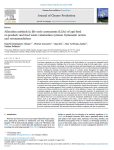Dominguez Aldama D., Grassauer F., Zhu Y., Ardestani-Jaafari A., Pelletier N. (2023). Allocation methods in life cycle assessments (LCAs) of agri-food co-products and food waste valorization systems: systematic review and recommendations. Journal of Cleaner Production, 01/10/2023, vol. 421, 138488.
https://doi.org/10.1016/j.jclepro.2023.138488
https://doi.org/10.1016/j.jclepro.2023.138488
| Titre : | Allocation methods in life cycle assessments (LCAs) of agri-food co-products and food waste valorization systems: systematic review and recommendations (2023) |
| Auteurs : | D. Dominguez Aldama ; F. Grassauer ; Y. Zhu ; A. Ardestani-Jaafari ; N. Pelletier |
| Type de document : | Article |
| Dans : | Journal of Cleaner Production (vol. 421, October 2023) |
| Article en page(s) : | 138488 |
| Langues : | Anglais |
| Langues du résumé : | Anglais |
| Catégories : |
Catégories principales 10 - INDUSTRIES ; 10.2 - IAA (en général)Thésaurus IAMM SECTEUR AGROINDUSTRIEL ; SYSTEME AGROALIMENTAIRE ; DECHET ALIMENTAIRE ; UTILISATION DES DECHETS ; ANALYSE DU CYCLE DE VIE ; ECONOMIE CIRCULAIRE |
| Résumé : | Food waste represents one of the major problems in the food industry, as it accounts for substantial social, economic, and environmental challenges due to the waste of resources along the food supply chain - such as waste of water, land, fertilizer, and energy. Recovering food waste and transforming it into valuable products is essential to reduce the impacts of such losses. Life Cycle Assessment (LCA) is a well-developed and standardized tool for evaluating the potential environmental impacts of a product system throughout the supply chain. However, evaluating the impacts and benefits of different food waste valorization and recycling pathways requires a deeper understanding of the different types of substrates and their applications in the consequent supply chain stages. Moreover, in agri-food LCAs, inconsistencies are found regarding the different multifunctionality allocation approaches, especially in contexts where the differentiation between co-production and waste generation is unclear. Therefore, the main goal of this study was to reconcile the aforementioned inconsistencies by (1) analyzing the current practices on allocation decisions in agricultural and other food-related LCAs and (2) providing practical recommendations for decision-making regarding allocation methods for specific types of food co-products and waste streams following the ISO 14044 requirements. Results show that many LCA practitioners are adopting a zero-burden approach (40%) to model the valorization of biomass such as food co-products and/or waste, even if these materials do not conform to the ISO 14044 definition of waste. Only consequential LCAs consistently applied an approach that adheres to the ISO 14044 allocation hierarchy. In attributional LCAs, economic allocation was found to be the most used approach (35%), followed by mass-based allocation (13%), suggesting that much of current practices are inconsistent with the ISO 14044 allocation hierarchy. The results also indicate that most LCA practitioners do not provide transparent justifications of their methodological choices, such as the definitions of co-products and wastes, cut-off criteria, and/or allocation procedures. Conclusively, the following criteria were identified as pertinent factors to consider when addressing to multifunctional food flows in LCA: the goal and scope of the study; a justified definition of the material flow type (co-product/waste); the LCA modeling approach (attributional/consequential); the description of the multifunctional processes (upstream/downstream); and associated allocation methods (compliant with the ISO guidelines). |
| Cote : | En ligne |
| URL / DOI : | https://doi.org/10.1016/j.jclepro.2023.138488 |







